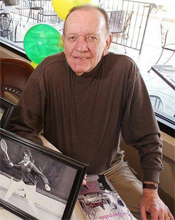Whitney Reed: The Air Force, The Korean War, and San Jose State
C. F. Stewart
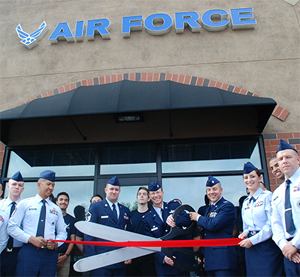
Whitney joined the Air Force in 1952, when men entered the military for a myriad of reasons. It could have been court-ordered, or to find a new life, or to avoid a hostile husband or father.
In Whitney's case it was the latter. He had formed a relationship with the daughter of a well known tennis coach whose ideas, to say the least, conflicted with his own. From the coach's perspective it was get out of town and don't come back. The well-known coach hustled Whitney into his car, drove him back to Alameda, and deposited him on his parents' front porch.
The coach told his father that Whitney was almost as incorrigible as Art Larsen. Whitney's dad said, "Let's go for a ride, son."
In front of the Air Force recruiting office, Whitney and his dad stopped at a red light. When the light turned green Whitney said, "The light's green dad." Whitney's dad said, "I know son. This is as far as you go."
Consequently, Whitney bid goodbye to the daughter, his parents, and the well-known coach and joined the Air Force for a four-year gig.
Four years in the Air Force went by fast. Tennis with a general in Tokyo and a short stint in Korea were the highlights. No shootings, no bombings, a little dysentery, but for the most part Whitney was out of harm's way.
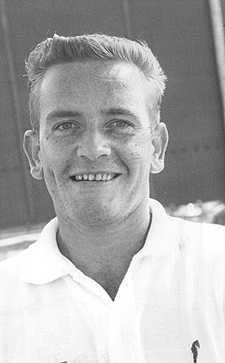
Too bad that couldn't be said for the Air Force, for Whitney's style was never in sync with the rules of the military. So far out of sync that one adventurous 2nd lieutenant threatened to have Whitney arrested and tried for desertion.
The Hand Cuffs
It was in the demilitarized zone during the peace talks. Whitney was supposed to monitor phones and relay any pertinent information. Every day at 6 a.m., a bus would pick up Whitney and deposit his replacement. One afternoon, with a big softball game in the offing, the bus came and there was no replacement.
From Whitney's perspective, the Air Force screwed up. They forgot his replacement. Consequently, Whitney grabbed his gear and jumped on the bus.
He reached the baseball field, just in time to throw the first pitch. The first batter hit a comeback grounder that Whitney fielded cleanly. He spun and threw to first. As his eye followed the ball into the mitt of the first baseman, he realized that the first baseman was, in fact, his replacement. As his eye focused a little farther, two very large MPs came into view.
One of the MPs motioned for Whitney and his replacement to stand at attention. Whitney and his replacement were placed in hand cuffs, and escorted to an area in the stockade reserved for the most serious of crimes, crimes that carry the death penalty.
Fortunately, for Whitney, he was not shot, and neither was his replacement. They lost a couple of stripes, and endured the humiliation of extra kitchen duty. An officer, who was not a tennis player, felt a more appropriate punishment would be somewhere between the rack and the guillotine. Whitney's relationship with a general in Tokyo helped obviate the situation. The general couldn't have his doubles partner shot, not with the annual service tennis tournament in the offing.
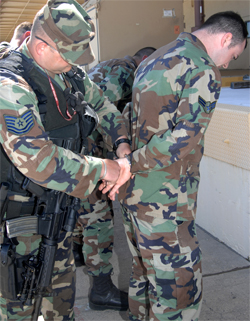
San Jose State
When Bob Hill roomed with Whitney at San Jose State, he ate nothing but yogurt. He ate nothing but yogurt because Whitney hated yogurt.
Bob Hill bought yogurt because if he bought steak, Whitney would eat the steak before it had a chance to get cold in the refrigerator. Poor Bob would spend $25 on food, and, maybe he'd get to eat about $5 worth. Whitney would bring a bunch of fruit salad from home as his offering for the week's food supply, and Bob hated fruit salad.
Whitney was a horrible roommate. If he wasn't eating all the food in the house, he was setting fire to the couch with an errant cigarette, or creating an atmosphere of a smoky barroom with the ubiquitous open beer cans. Bob was not as forgiving as most of Whitney's buddies from that era, and when school started in 1961, Whitney needed to find another roommate.
Bob played doubles with Whitney in college from 1958 to 1960, and they did well. They won most of their matches because they simply outclassed most of the teams in the country. They'd lose a set now and then, mostly because of Whitney's quirkiness.
At Stanford in 1959, they won the first set against Stanford's No. 1 team 6-0. In the second set, Whitney felt that Bob made a bad call, so he tanked the second set. Bob and Whitney won the third set 6-0.

Alex Olmedo and Ed Atkinson notwithstanding, Bob and Whitney should have won the NCAA tournament in both 1959 and 1960. They lost in the quarterfinals both years. In1959, it was too much booze, and in 1960 it was not enough food.
In 1959, Whitney and his girlfriend spent the evening before the quarterfinals attempting to drink all the booze in the greater Chicago area, and in 1960, Whitney simply forgot to eat. When his blood sugar level went to 0%, Whitney's effort on the court also went to 0%.
Bob Was Done
By 1960, Bob may have had his fill of babysitting Whitney. He had rescued him from every den of iniquity in the San Jose area, and for his effort, he had to eat yogurt for two years.
He hauled Whitney to the hospital after Whitney got smashed in the eye playing a pickup basketball game, and he had to put gas in Whitney's car to get there. He was tired of living in a barroom environment. He knew Whitney's act intimately, and, as far as Bob was concerned, it was getting near the final curtain.
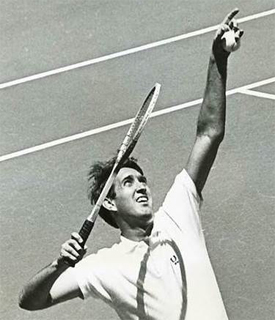
NCAA Singles
The NCAA singles final in 1959 was a contributing factor to the demise of the Hill/Reed relationship. Whitney was to play Donald Dell in the finals at noon, only Whitney was sacked out with his girlfriend at noon.
It seems the responsibility of getting Whitney to the courts on time fell on Bob. Butch Kirkorian, San Jose's tennis coach, was unavailable due to prior commitments, and that left Bob in the all-too-familiar role of babysitter.
Bob found Whitney in his hotel room wrapped up in sheets, blankets, and his girlfriend. The room smelled like the amalgamation of a San Francisco Mission bar, and a South Central LA gymnasium.
Bob shook Whitney and said, "Whitney, the finals were at noon and it's twelve thirty." Whitney looked up and said, "Who won?"
Whitney was incredibly lucky Marty Riessen's dad was running the tournament, and, for whatever reason, Riessen's dad let Whitney play the final. Whitney easily defeated Dell in straight sets.



